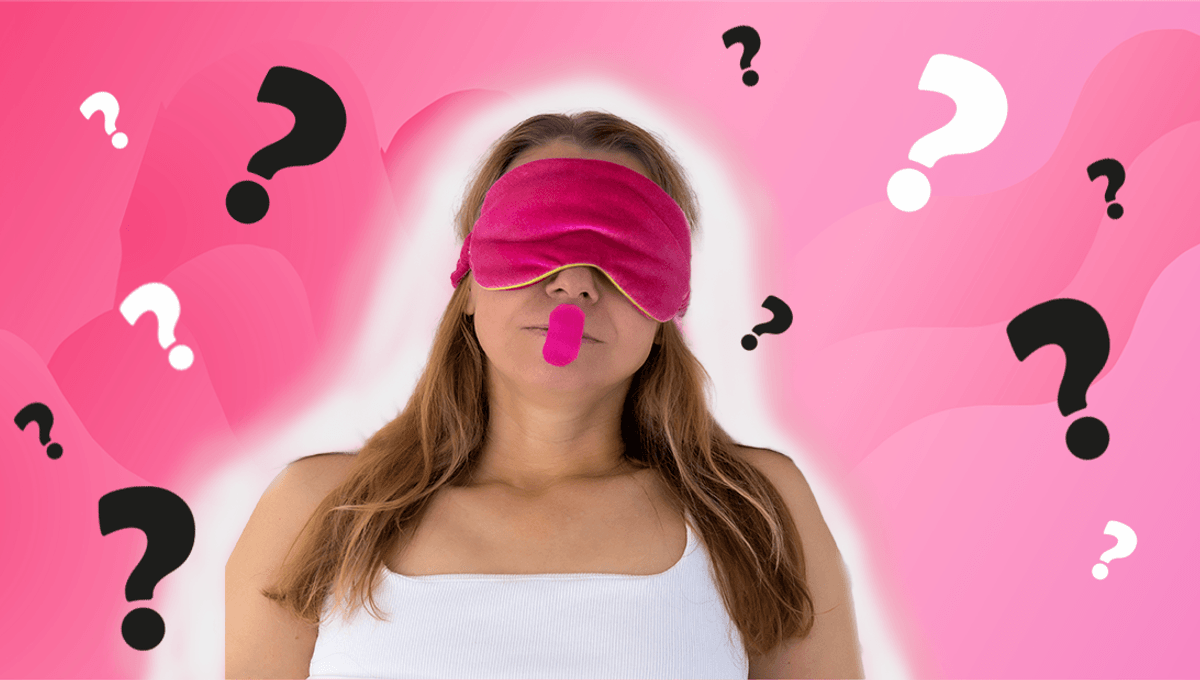
Most people’s nighttime routine involves brushing their teeth, washing their face, maybe even a spot of skincare. Over the last couple of years, however, social media has introduced us to a bizarre new addition: sticking tape over your mouth. That sounds… dangerous, right? But the people who do it claim it has a wealth of health benefits – so what’s the truth?
What is mouth taping?
Mouth taping is pretty much what it sounds like – putting tape over your mouth, specifically before you go to bed so it’s on while you’re sleeping. The idea is that it stops people breathing through their mouths when they’re asleep, instead leading them to breathe through their noses.
This, proponents claim, can not only help people to sleep better, but also benefit their oral health, prevent wrinkles, and even change the shape of their jawlines. It’s merely a side benefit that they’ll likely ace their role should they be called up to play a hostage in the new series of Criminal Minds.
It’s no small trend either; on TikTok, a total of 97,500 posts can be found at time of writing under “#mouthtaping” and “#mouthtape” combined, some of them comical, but many touting the apparent benefits of the practice.
Does mouth taping have any health benefits?
When it comes to the alleged benefits of mouth taping for sleep, scientists have been keen to investigate. That includes Dr Brian Rotenberg, a researcher at the Lawson Research Institute, London Health Sciences Centre Research Institute, and Schulich School of Medicine & Dentistry, who with his colleagues recently conducted a systematic review of research on the safety and efficacy of mouth taping in people with mouth breathing, sleep disordered breathing (SDB), and obstructive sleep apnea (OSA).
“In the language of social media influencers, it seemed a bit ‘sus,’ so we examined what science is telling us about this trend and whether or not it is safe,” said Rotenberg in a statement.
Rotenberg and colleagues carried out a detailed examination of 10 studies, encompassing 213 patients. Overall, they found minimal evidence to support the efficacy of mouth taping for mouth breathing, SDB, or OSA. In fact, they also concluded that it could even be dangerous for people with these conditions, with mouth taping risking restricted airflow, extra stress on the respiratory system, and suffocation in cases where people also have a nasal obstruction.
The authors did, however, acknowledge that there were some limitations to the review. The small number of studies included, the wide differences between them, and the poor quality of all led the researchers to conclude that the field is in dire need of more, higher quality studies to get some truly conclusive evidence for safety and efficacy.
Still, they believe the potential risks are reason enough to avoid mouth taping.
“Our research shows that taping the mouth shut during sleep is dangerous, especially among those who may not be aware they have sleep apnea,” said Rotenberg. “These individuals are unknowingly making their symptoms worse and putting themselves at greater risk for serious health complications like heart disease.”
When it comes to oral health, there are potentially some benefits to not breathing through your mouth – mouth breathing can dry your mouth out and leave you with bad breath. However, there are plenty of other, less dangerous ways to combat things like bad breath, all of which depend on determining its cause – even if it did otherwise work, mouth taping wouldn’t be much help if you didn’t brush your teeth, for example.
As for whether or not mouth taping is going to stop you from getting wrinkles, social media influencers might provide anecdotal evidence in the form of dubious before and afters, but there’s no scientific evidence that it does anything. Not to mention, showing signs of aging could be viewed as somewhat reassuring rather than something that needs to be prevented – the alternative to getting older is death, after all. A few wrinkles around the mouth seem pretty bearable in comparison to that.
The bottom line
The conclusion? Mouth taping really isn’t worth it. It’s potentially dangerous, with little solid evidence of health benefits and a good chance that you’ll jump-scare your partner in the middle of the night.
It’s also worth pointing out that just because something is popular on social media, doesn’t mean that it’s good for you.
“It’s easy for misinformation to run rampant on social media; we’ve seen this countless times over the past few years,” said Jess Rhee, an author on the systematic review and a Schulich School of Medicine & Dentistry resident who is training at London Health Sciences Centre. “We need to make health decisions based on strong scientific evidence. Our hope is that people stop taping their mouths during sleep and recognize it is dangerous.”
If someone’s concerned about their sleep, oral health, or any of the other issues that mouth taping claims to target, the best thing to do is speak to a healthcare professional – they’ll be able to guide you towards much less risky, well-supported alternatives.
All “explainer” articles are confirmed by fact checkers to be correct at time of publishing. Text, images, and links may be edited, removed, or added to at a later date to keep information current.
The content of this article is not intended to be a substitute for professional medical advice, diagnosis, or treatment. Always seek the advice of qualified health providers with questions you may have regarding medical conditions.
Source Link: Mouth Taping: Does This Viral Social Media Trend Really Work – And Is It Safe?